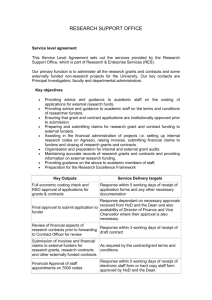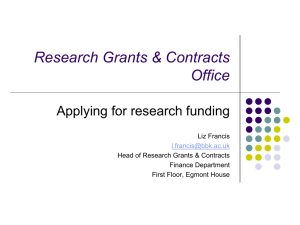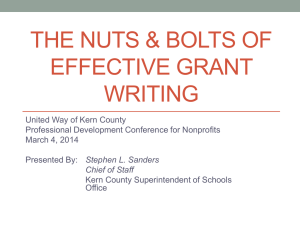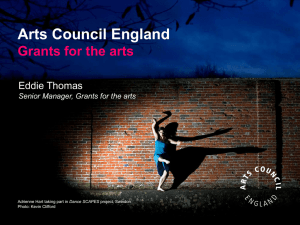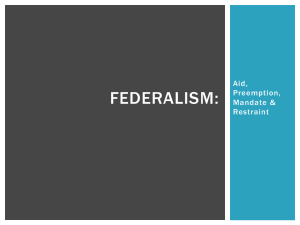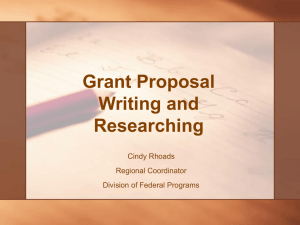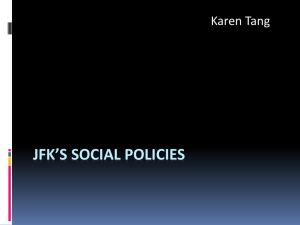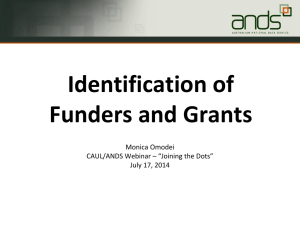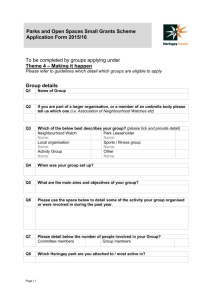Med Sch. Sourcing for Research Grants
advertisement
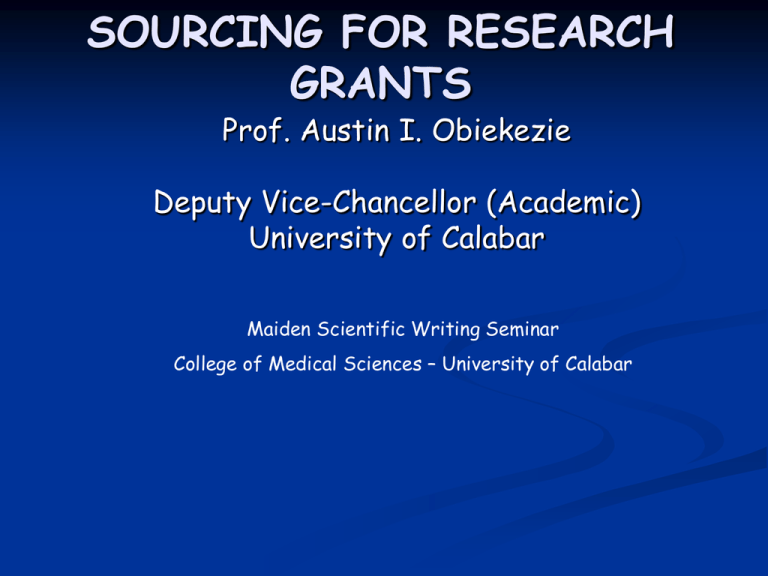
SOURCING FOR RESEARCH GRANTS Prof. Austin I. Obiekezie Deputy Vice-Chancellor (Academic) University of Calabar Maiden Scientific Writing Seminar College of Medical Sciences – University of Calabar Presentation Outline Definition of Terms Why do we need research grants? Types/Forms of Research Grants Research Funding Bodies The Grantmanship Flowchart Define the Project Identify Funding Sources Contact Funders/Program Officers Acquire Proposal Guidelines Determine submission deadlines/personnel needs etc Write and submit Grant Proposal Essential Tips in Sourcing Grants Overcoming Funders’ antipathy – The Nigerian Problem Where do we stand in UNICAL? Conclusions Definition of Terms Research Grant Funding Monetary award given by a government agency, foundation, corporation or other entity to fund a particular project Research Funding Body Grantmanship the art of acquiring peer-reviewed research funding Types / Forms of Research Grants Small Grants Programs Tailored to individual research Small to medium size volume Best for the beginner/graduate/fellowships May not require substantial track record of research NGOs / Charity organizations, governments Examples: TDR, IFS, IoT (ETF) etc Large Institutional Grants Large in volume and complexity Governments and large corporations Examples: Carnegie Foundation, WHO, etc Types / Forms of Research Grants Scholarships Fellowships /Residencies Endowments Travel /Conference Grants There is something for everyone!!! Categories of Support Operating – running program to meet community needs Special Project – new project or project with limited timeframe Capital/Equipment – specified amount for construction, renovation, expansion, purchase land or equipment Endowments - planned gifts, will or trust Why do we need Research Grants? Fund individual research programs Fund Graduate Research Enhanced institutional capacity The aim of applying for funding is to obtain the resources required to perform the desired research. What Research Grants Can do Vast increase in the research revenue base of the University/ Department/ College Mentorship possibilities at the international level Join the elite club group of international grant networks One good grant deserves another – sets you up for many future grants in a way that could make the entire difference to your careers Why people/organizations fund research Humanitarian purposes Advancing business interests National exigencies/policies Religious obligations Tax rebates/holidays Just to feel good Show off… Regardless, the funds are made available for good use Good to identify the driving force behind the granting body Research Funding Bodies Grant Sources Governments (Federal, State, LGA) Non-governmental organizations Foundations Bilateral Health organizations Corporations Philanthropists Nature / Types of Funding Bodies Funding organizations differ in the degree of rigour they expect and in the amount of competition for their funds Prestigious government-funded organizations have very high standards and are extremely competitive. What you need to know about the funding body Is it interested in the knowledge the research project will provide? Does it provide funds of sufficient magnitude? Each type of organization will require a different type of grant application, targeted to their interests and requirements Assessing Funding Eligibility Eligibility Type of organization Geographic restrictions Population, other characteristics – gender etc Size of Award Sufficient amount to complete program activities Number of grants Award size and duration Project Focus Project complements funder’s goals and priorities Assessing Funding Eligibility Cont. Type of Activity Specified use of funds Restrictions Matching funds Expenditure limitations Evaluation requirements The Grantmanship Flowchart Grantmanship Process Develop Project Idea Prepare/ Identify Submit Funding Source Application Await Outcome Grant Sourcing Flowchart •Define your Project •Identify Funding Sources •Contact Funding Agencies / Bodies •Acquire / Familiarize with Proposal Guidelines •Know the submission deadline •Determine personnel needs and other issues •Write and submit the Proposal 1. Define Your Project Clarify project purpose / write a concise mission statement. Define the scope of work to focus your funding search. Determine the broad project goals and identify the specific objectives and requirements Decide who will benefit. Draft expected project outcomes in specific measurable terms. Draft a timeline that includes the planning phase, the period of searching for funds, proposal writing, and the intended project start date. 2. Identify Funding Sources Advertisements in mass media Professional/Institutional Newsletters Acknowledgements in articles/presentations Colleagues –Word of mouth Networks Research Offices (Academic Planning/Directorate Internet Sources. (search engines, computerized databases (Africa Research.Net etc. Do not limit search to one source 2. Identify Funding Sources contd’ SHOTGUN APPROACH vs. RIFLE APPROACH SHOTGUN: Shoot a scatter shot and see what falls. Look for funding agencies, investigate what they fund, and apply for something from the agency. Your goals are broad enough to be modified to fit their goals. 1. 2. RIFLE: Take careful aim at one specific target. Look for funding agencies that fund only what you want. Search for an exact match to fund your project using your specifically stated goals. 2. Identifying Funding Sources Look for a match between your project and the grants you seek by looking for consistency between the purpose and goals of your project and the funder. In addition, pinpoint specific funding priorities and preferences. Request proposal guidelines. Also request a list of projects previously funded through this specific grant program; an annual report may be available Identify funding source Match objectives – research interests – your personal characteristics career phase gender, ethnicity location Internet Websites The Grantsmanship Center - www.tgci.com The Foundation Center - www.fdncenter.org GuideStar.org – www.guidestar.org GrantsNet - http://www.os.dhhs.gov/grants/index.shtml Grants.gov – http://grants.gov/Index Research Arica.Net Others – WHO, TDR, MRC, 3. Contact Funders Think of the funder as a resource. Identify a project officer who will address your questions. Some funders offer technical assistance, others do not. If it’s available, ask for technical assistance, including a review of proposal drafts. Inquire about how proposals are reviewed and how decisions are made. 3. Contact Funders contd’ Inquire about budgetary requirements and preferences. Are matching funds required? Is in-kind support acceptable as a portion of applicants' share? What may be counted as in-kind support, and how might it be applied? What are the payment processes, including cash flow etc. Remember, the contacts you make may prove invaluable in the future. 3. Contact Funders contd’ Letters of Inquiry Alternative to a call or visit (Investigate organization to find preference) Do homework before the letter for previous funding history, types of projects, amounts Provide information about your Dept./Unit/ Medical School Provide information about your proposed project 3. Contact Funders contd’ Letters of Inquiry 1-2 pages! Par 1 -- Who are you? Mission, organization, you are seeking funds Par 2 -- Why this agency? You understand their priorities Par 3 -- What is the need? Clear and brief Par 4 -- What's the plan? Bullet goals/objectives Par 5 -- Why fund you? Uniqueness, qualifications Par 6 -- How much? Broad categories Par 7 – Closing – thank you, contact information, whether Letters of Intent Introduction Needs Demographic and statistical evidence Project Description Why you are writing Mission and population served Link funder’s priorities and project goals Solution How it addresses need Best practices Letters of Intent Project Plan Activities, timetables, methodology Organizational Capacity Ability and commitment Previous work and staff qualifications Budget Funding request, organizational support and other resources Sustainability Project continuation 4. Acquire/Familiarize Proposal Guideline Read the guidelines carefully, then read them again. Guidelines usually tell you about: submission deadlines eligibility proposal format: award levels forms, margins, spacing, evaluation process and restrictions on the number criteria of pages, etc. review timetable budgets funding goals and priorities award levels evaluation process and criteria who to contact other submission requirements 5. Know Submission Deadline Plan to submit your proposal on or preferably before the deadline. Determine what format the funder requires for submission. Be realistic about whether you have time to prepare a competitive proposal that meets the deadline. Know the funder's policies on late submissions, exceptions, and mail delays. Find out how the funder will notify you about the receipt and status of your proposal. Factor this information into your timeline. 6. Determine Personnel Needs etc Identify required personnel both by function and, if possible, by name. Contact project consultants, trainers, and other auxiliary personnel to seek availability; acquire permission to include them in the project; and negotiate compensation. Personnel compensation is important budget information. Write the Proposal Topic of Full Presentation Essential Tips in Sourcing Research Grants Overcoming Funders’ Antipathy Your funding track record Internet presence in terms of publications etc Get a well known external expert on your side – anyhow Check your e-mail address (yahoo.com and other similar sites are 419 media) Where do we stand in UNICAL? What is our Grantmanship Quotient - in the University, in the College?? How do we compare with other Institutions – Abysmal!!! How do we improve the culture of Grant Hunting? What requirements should be put in place – What are the responsibilities on the part of administration and on the part of staff?? Conclusions /Way Forward for Medical School Initiative should not stop at the maiden workshop Constitute a Grant Hunting Party of committed research staff with specific targets We must overcome self-centeredness Continuous and rigorous training for staff Subscribe to Searchable Research Databases (Africa Research . Net) Research Africa.Net Subscription Rates Grant Money is not the problem, it is the absence of ideas and drive
